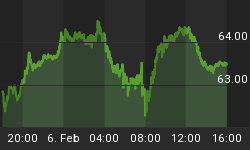Yes, boring old bonds. While the Dow 12,000 siren song calls the public to contemplate all those perceived riches they are missing out on, and gold bugs struggle with their relic's labored activity down in the corrective dumps, the resource sectors are flashing "on sale" signs (for long term holders), and the bears try to outlast their Autumn Armageddon, we simply go back to the heart of the matter; the bond market. The Fed watches the interplay between their policy and inflation expectations very closely, so why shouldn't we? On Friday I wrote "The Fed will decide nothing" and what I meant was the bond market will decide policy for them. Ours is a system of chronic inflation. That is our growth fundamental. This is beyond dispute as most of the dollar's former value has gone to money heaven and most major global currencies are on the same path. In a fiat system, it is growth in liquidity that spurs economic growth at the expense of currencies. It is as simple as that. But there are periods where we pretend to hate inflation and it is an enemy that must be eradicated. We are in one of those periods. Remember, inflation is not the recent $80 oil or $3+ gas. It is not your tuition, food and housing prices rising. Inflation is the liquidity in the system, from various money aggregates, that chases those prices higher. The headlines on the oil price and housing certainly have helped to tamp down inflation expectations.
As far as asset allocation goes, it is important to continually watch the relationship between the "free" bond market and the Fed controlled short end. The $TNX and the rising inflation expectations it implied caused the Fed to remain firm on its policy. We have now had the predictable decline in rates (remember our target was 4.6% - 4.8% as rates were touching 5.2% and inflation remained the primary headline) but even as oil, housing and gold remain under control, the bond market is getting edgy.


The $TNX is bearing out what I see in industry at the moment; there are a lot of excess dollars chasing assets. First and foremost commercial real estate, but also productive business enterprises. The smarter of the money in this stagnant liquidity pool is seeking to transform itself into something healthy. The dumber money is just playing in the casino (hot stock sectors). The yield curve ($TNX/$IRX ratio) appears to be trying to make a bottom, but we have said that before. At this time it looks like there is a bit of a rounding bottom trying to happen along with longer term (all of 2006) and short term (from August) bullish divergence in play on RSI, MACD and other indicators as well. The implications are critical and must be correctly interpreted in order to allocate investments in alignment with macro trends. If the curve turns up in a sustained manner, it will imply that the Fed is becoming more dovish in relation to the bond market's pricing of debt. Note that this may not mean the Fed is done raising rates, but a rising curve would mean the Fed is falling behind the curve. Ten year rates may have seen their highs (one could envision a double top above 5%), but their relationship with Fed policy very likely hasn't. If that is the case, this is considered a very beneficial environment for gold and perhaps a bit later, commodities and resources. As far as general stocks go, they are having their day in the sun. This cannot be denied. Corporations are generally doing quite well based on the macro events to date. While I don't necessarily expect the stock market to crash any time soon, I do expect it to go back to it's secular under-performance when measured in things of value, like the various resource sectors. For reference, here is the most recent Dow-Gold ratio chart I worked up on the blog yesterday.

Stock and ETF symbols relevant to this analysis include SHY, IEF, TLT, GLD and DIA.















